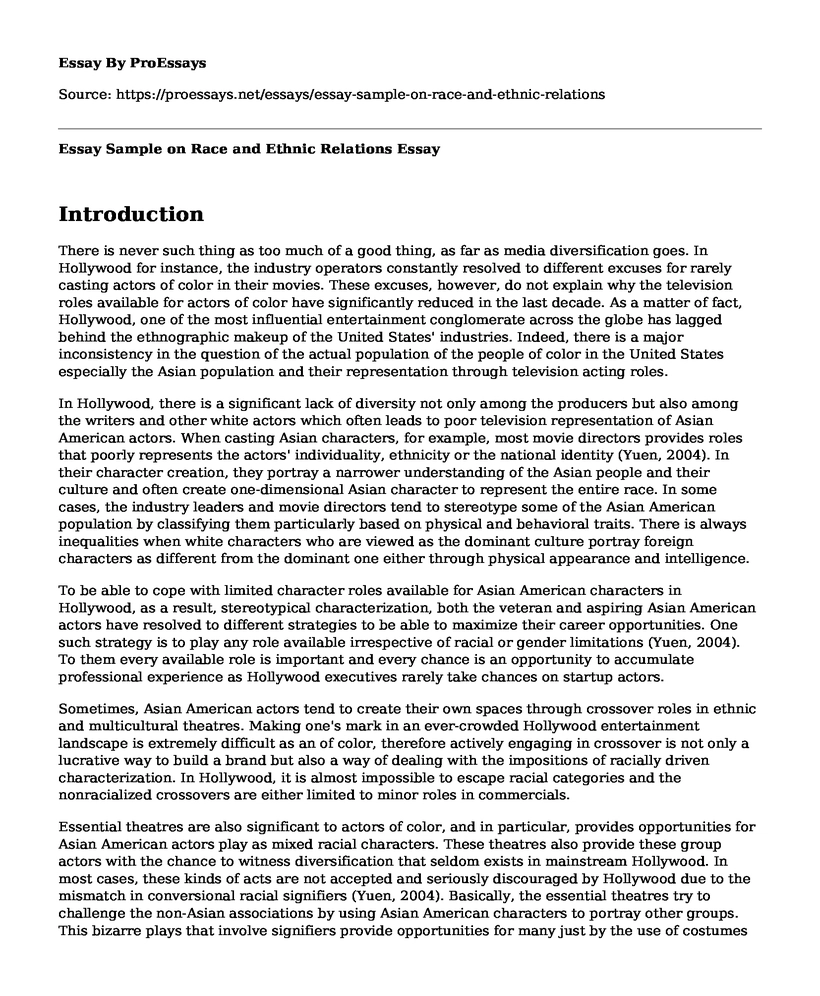Introduction
There is never such thing as too much of a good thing, as far as media diversification goes. In Hollywood for instance, the industry operators constantly resolved to different excuses for rarely casting actors of color in their movies. These excuses, however, do not explain why the television roles available for actors of color have significantly reduced in the last decade. As a matter of fact, Hollywood, one of the most influential entertainment conglomerate across the globe has lagged behind the ethnographic makeup of the United States' industries. Indeed, there is a major inconsistency in the question of the actual population of the people of color in the United States especially the Asian population and their representation through television acting roles.
In Hollywood, there is a significant lack of diversity not only among the producers but also among the writers and other white actors which often leads to poor television representation of Asian American actors. When casting Asian characters, for example, most movie directors provides roles that poorly represents the actors' individuality, ethnicity or the national identity (Yuen, 2004). In their character creation, they portray a narrower understanding of the Asian people and their culture and often create one-dimensional Asian character to represent the entire race. In some cases, the industry leaders and movie directors tend to stereotype some of the Asian American population by classifying them particularly based on physical and behavioral traits. There is always inequalities when white characters who are viewed as the dominant culture portray foreign characters as different from the dominant one either through physical appearance and intelligence.
To be able to cope with limited character roles available for Asian American characters in Hollywood, as a result, stereotypical characterization, both the veteran and aspiring Asian American actors have resolved to different strategies to be able to maximize their career opportunities. One such strategy is to play any role available irrespective of racial or gender limitations (Yuen, 2004). To them every available role is important and every chance is an opportunity to accumulate professional experience as Hollywood executives rarely take chances on startup actors.
Sometimes, Asian American actors tend to create their own spaces through crossover roles in ethnic and multicultural theatres. Making one's mark in an ever-crowded Hollywood entertainment landscape is extremely difficult as an of color, therefore actively engaging in crossover is not only a lucrative way to build a brand but also a way of dealing with the impositions of racially driven characterization. In Hollywood, it is almost impossible to escape racial categories and the nonracialized crossovers are either limited to minor roles in commercials.
Essential theatres are also significant to actors of color, and in particular, provides opportunities for Asian American actors play as mixed racial characters. These theatres also provide these group actors with the chance to witness diversification that seldom exists in mainstream Hollywood. In most cases, these kinds of acts are not accepted and seriously discouraged by Hollywood due to the mismatch in conversional racial signifiers (Yuen, 2004). Basically, the essential theatres try to challenge the non-Asian associations by using Asian American characters to portray other groups. This bizarre plays that involve signifiers provide opportunities for many just by the use of costumes and accents.
Conclusion
In conclusion, there is a major inconsistency in the question of the actual population of the people of color in the United States especially the Asian population and their representation through television acting roles. The lack of diversity among the leaders of Hollywood and the movie writers leave very limited acting opportunities for Asian American actors. Their culture is often represented poorly and involves stereotypes based on physical and behavioral traits. These actors strive to break through the white-dominated industry by accepting stereotypical roles just to gain professional mileage. Due the limited roles left for the actors of color, Asian American actors tend to take up raciaized roles that no other person would. Some of the Asian American actors tend to engage in crossover performances in preparation for major roles in Hollywood. Furthermore, essential theatres have provides them with crucial mixed racial characters.
Discussion Questions
What is the extent to which Hollywood manufacture characters based on individuals' gender and skin color that has often resulted in the poor representation of people of color, especially the Asian Americans in television series and Hollywood movies?
To what extent does the Asian American actors in Hollywood, whether experienced or new to the industry, strive to cope with adversity and discrimination based on race and ethnicity?
Is Hollywood what most people think it is, "an institution of racialization" in which the industry leaders provide the scriptwriters, producers and the directors with a predetermined physical and behavioral traits of the actors?
By creating a space of their own through crossover roles in ethnic and multicultural theatre, do the Asian American actors limit the chances of other actors racially marginalized groups such as the Hispanic and the African American actors?
References
Yuen, N. W. (2004). Performing race, negotiating identity: Asian American professional actors in Hollywood. New York, NY: Routledge
Cite this page
Essay Sample on Race and Ethnic Relations. (2022, Dec 08). Retrieved from https://proessays.net/essays/essay-sample-on-race-and-ethnic-relations
If you are the original author of this essay and no longer wish to have it published on the ProEssays website, please click below to request its removal:
- Essay Sample on Sociological Perspective Sheds Life Position in Life and Society
- Ethical Dilemma at Northlake Paper Example
- Essay Example on Latour's 'Lab Life': Actor-Network Constructivism
- Essay Example on Antigone: A Tale of Clashing Themes and Gender Roles
- Annotated Bibliography on Parental Trust: A Growing Issue in Society
- Essay Example on Top Girls & A Raisin in the Sun: Women's Place in Society
- Essay Example on LGBTQ: Challenges Faced by the Community







